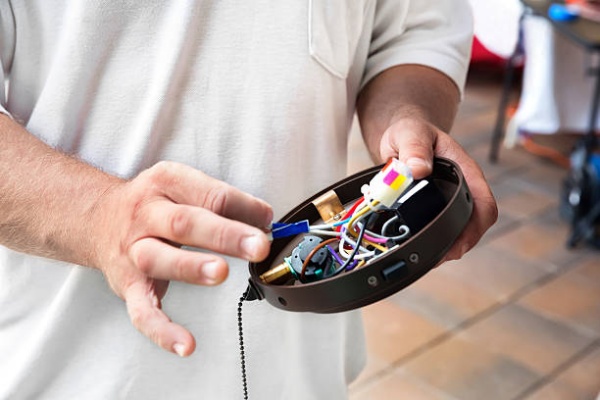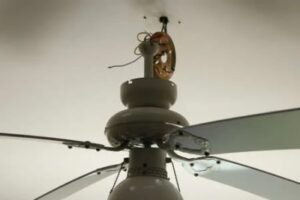
A ceiling fan is a great way to keep your home cool in the summer, but did you know they can also burn out? The most common problem with electric motors is overheating. When resistors burn out, it can cause the motor to stop working correctly and even result in a fire!
You should always make sure that your fans don’t have any before buying them, so you know what kind of quality they offer for their price tag – because if these cheap imported ones overheat too much, then there’s no telling how much damage will be done by itself until something breaks apart inside due breakage caused from excessive stress placed on components while trying recover lost power after an accident-like interruption event.
Signs of Ceiling Fan Motor Burn Out and Other Ceiling Fan Problems

Burning Smell
You might notice a burning smell from your fan if it has been overheated. This could mean that there are ball bearings or other components needing repair, so be sure to take care when fixing this issue.
The ceiling fan is running slow or not working at all speeds
When you turn on your AC unit, does it take longer than usual for the fan blades to start spinning? This could indicate that there’s some problem with either motor or fan. You should also check if these parts are broken beyond repair and replace them accordingly so as not to leave yourself exposed to heat waves!
Fan Stuck in One Speed
One of the most common problems with a ceiling fan is getting stuck on just one speed. This may be caused by a blown capacitor, which determines how much power gets delivered to your fan motor and can make it difficult for you to fix this problem if there are other issues at hand!
Noise or humming ceiling fan
Almost any ceiling fan has a sound problem because they’re just a device. An old ceiling fan model needs a good amount of maintenance. But how does one control a fan’s humming sound when it is heard on a louder volume or otherwise?
The most helpful advice to troubleshoot the problems is to check everything in the object’s movement. Ceiling fans are packed with numerous parts, usually from the top surface where roof support beams are located. A tiny screw holds everything in place to prevent damage to a fan assembly. Keeping them in place is not accessible if the items are brand new.
Look for a buzzing sound. A humming noise is an easy fix or even may disappear on its own or signal a problem with the fan’s motor.
Flickering lights
Newer ceiling fans are infused with LED lighting for maximizing energy saving. In certain circumstances, the lights will dim, providing excellent bonuses. The worst thing has to have an LED dimming switch when you use it for a wall switch.
Normal dimmers make the lights in LEDs flicker. Buy ceiling fans with an integrated light switch with the LED lamp. However, the problem continues because another issue is causing flickering. It could be an internal limiter.
Broken flywheel
A damaged flywheel is one cause of a ceiling fan not rotating. However, it is uncommon. The blades of certain ceiling fans are fitted with rubber flywheels rather than the engine itself. Because it requires maintenance, a flywheel is fragile and brittle.
Is it possible that it’s broken? Motors may still operate or run in such a case, but the fan blades will never revolve. The answer here is to replace the flywheel. A professional is required.
What to Do?
So when you notice your ceiling fan start smelling like it’s burning, these are a few things you can do to troubleshoot it.
The issue with turning on the fan is most likely a blown motor capacitor. These die due to age or overheating and are replaced. Remove all components from your vehicle and install a new motor. The capacitors are black boxes attached to an electrical cable; when they burn out, they become visible and recognized 9 times out of 10.
Removing and reusing wire by cutting it and cutting it again is simple. When you replace a blown motor capacitor, you must obtain the same electricity as the original capacitor or meet the exact electrical requirements before installing it.
The odor might be caused by the wiring behind the wall or the switchboard. This first inquiry is critical in selecting your future steps.
Fix Faulty Wiring
When your electrical system emits a burning odor, it is usually due to a damaged wire or an overloaded power source. As a result, the circuit breaker is generally tripped. A burning smell from your home’s electrical system could be because of an arc between two wires or a conductive metal mixture and sparks. This can happen with black soot covering the fan. If there has been any fault in correctly wiring up these appliances, fixing them will require rewiring!
Replace Burnt Out Motor
If your old ceiling fan is spinning slowly and emitting a burning odor, it might be due to a worn-out motor or dry bearings. In addition, the circuit breaker will not trip in this instance. You may repair this problem by replacing the motor, applying oil to the dry bearings, or replacing any other problematic parts, such as a blown capacitor. If you do not want to invest in restoring an old fan, purchasing a new ceiling fan is the best solution.
Safety Tips

Working on a ceiling fan can be dangerous if not wired correctly. For this reason, it’s always essential to ensure you have basic safety precautions before working up there! It might also help turn off power at the circuit box, so accidents don’t result in catastrophic injuries. Ask for assistance when removing your entire fan, especially since two people typically need help with larger ceiling fan models.
The fan motor housing is held together with screws and must be unscrewed before accessing the interior. Make sure you turn off your circuit breaker because there may still be charged ceiling fan capacitor inside that could cause an electrical shock if touched or come into contact while working near them!
FAQs
How long do ceiling fan motors last?
The life span of an electric system is generally cited. The average lifetime of the exhaust fan in an air conditioner is eight to 15. In some countries, this will be ten times longer.
Why did my ceiling fan suddenly stop working?
It may be due to the breakage or not. Check the panels for confirmation. Circuit breakers may cause problems when there’s a loose connection or wiring. Your ceiling fan can be broken down due to mechanical issues, such as ball bearings or overheating engines.
Can a motor go out in a ceiling fan?
Indeed, the engine could be repaired or replaced. Some machines can be plugged into a fan. If you don’t have one of these, you must wire the motor back together in the same color.
Conclusion
If your old ceiling fan is spinning slowly and emitting a burning odor, it might be due to a worn-out motor or dry bearings. In addition, the circuit breaker will not trip in this instance. You may repair this problem by replacing the motor, applying oil to the dry bearings, or replacing any other problematic parts, such as a blown capacitor. If you do not want to invest in restoring an old fan, purchasing a new ceiling fan is the best solution.
Last Updated on
- How to clean standing fan easily - September 24, 2022
- How Long Does a Fan Last? – Electric fan Maintenance Guide - September 23, 2022
- Can electric fans be left on 24 hours a day? - September 23, 2022
